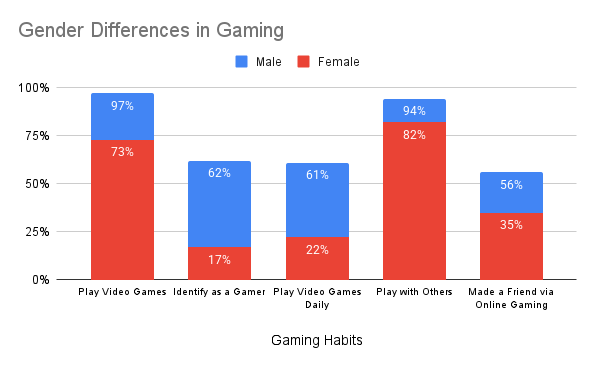How Video Games Became the New Social Space for Young Adults
By Laari Ruby
Humans are social animals. We need interpersonal connection and time with other people to feel fulfilled. For young people, video games have begun acting as a digital third space where that time can be spent. These virtual environments are places where people from all over the world can connect over a shared game. People can unwind after a long day and create new friendships or maintain long distance ones.
While video games are often seen as an isolating form of entertainment, many young adults actually use them as a key tool for social bonding, though how they are used can vary widely depending on the gender of the players and game types.
The “third place” is a sociological concept developed by Ray Oldenburg that refers to the social surroundings separate from home or the workplace. They act as anchors in a person’s community that allows them to participate in civic engagement and build a sense of belonging. A third place is somewhere people go to relax, see familiar faces and have a good time.
Traditionally, this could be coffee shops, bars and other gathering spaces.
In the ever-evolving digital age, these third spaces can be difficult to access due to expenses, transportation or a lack of free time. Especially for younger generations and teens who cannot yet drive, video games and online gaming are increasingly becoming that third place, one where they don’t need to leave home to get there.
According to the Pew Research Center, with 85% of teens reporting that they play video games, and 41% playing daily, there is a huge number of people in the same age range who have the ability to connect over a shared interest. Among these teens who game, 89% play with others either online or in-person, 72% play specifically to spend time with others, and 47% have made a friend through online gaming.
Within these statistics, there is more variation when gender is considered. Men and women have different games they prefer, motivations for playing, and frequencies they play. Men are more likely than women to prefer playing with others and to have made a friend through their online gaming.

The differences in how men and women utilize the social possibilities of video games may be explainable by a popular social theory developed by anthropologist Robin Dunbar. He argues that men develop friendships by engaging in work or a hobby, or shoulder-to-shoulder friendships. Women’s, in contrast, develop friendships that are more rooted in emotional connection and sharing information, or face-to-face friendships.
“I like to play Fortnite with my friends, not because it’s my favorite game, but because everyone plays it,” said Tyler Parrish, a senior mechanical engineering major.
Men often use video games as a way to create and maintain friendships because they can speak with each other while playing. According to Pew, boys who play video games are more likely than girls to say it has helped them with their friendships, 55% compared to 35%. Whether they prefer the game or not, they play to engage in the social element.
In this interview, 22-year-old Parrish describes how gaming helps him stay in touch with friends.
Men play video games often as a way to “see” their friends. Women, however, are much less likely to play video games or identify themselves as gamers. Video gaming is male-dominated, with many women experiencing some form of discrimination or harassment during their online games. Men are more likely to play with others than women and far more likely to have made an online friend through a video game.
This doesn’t mean that women don’t enjoy playing video games during their social gatherings. Many women that play video games don’t identify themselves as gamers, and many women that play video games don’t necessarily do so for the game itself, but rather for the entertainment it can provide a group of people. Women may find they prefer to play in person, with people they already know.
Video Package: https://youtu.be/YA7WLHoglTY
Emily Schuman, a senior microbiology major, says she and her roommates play Mario Kart because it is a fun way for them to all participate in the same activity when they spend time together. Schuman said she and her roommates do a wide variety of things to spend time together from playing board games and shopping to just carpooling to their classes.
While Schuman and her roommates do not identify as gamers, they play Mario Kart nearly every week. Like with many women, they don’t view these games as a hobby but as a form of quality time.
Gaming can act as a stress reliever, with a recorded ability to reduce anxiety and boost mood. A study done by Oxford University’s Oxford Internet Institute shows that nearly three-quarters of players were likely to experience a mood uplift after 15 minutes of gameplay.
Some games are designed to be extremely competitive and high stress, such as first-person shooter games or horror games. Others are designed to be very relaxing and low stakes, such as Stardew Valley or Animal Crossing. The effect a video game might have on someone’s emotions depends on both the game someone chooses and their pre-existing levels of emotional regulation. It can be highly beneficial to play a video game to improve a mood, but it is important to select a game that will help make that happen.

Onochie Ikegbunam, an engineering major, plays Rocket League on Friday, February 21 in The Tate Gameroom. He chose the game to pass time while he waited for his boss to get to the Tate Student Center after his class was over. (Photo/Laari Ruby)
Onochie Ikegbunam, an engineering major, spends his downtime in the Tate Gameroom on the University of Georgia’s campus while he waits for his boss. “I just come into this place to just like, cool off and then play one or two games,” Ikegbunam said. Ikegbunam is an example of someone who plays video games casually to relieve stress between his daily commitments.
Video games are a powerful and flexible social tool, especially for young people still learning to navigate maintaining relationships. As our society becomes more reliant on technology and the internet, our third spaces also begin to move onto these online platforms. Gaming is a way for many people to stay connected with one another and offers new ways to enjoy another person’s company. Video games can act as a stress reliever and a mood booster. Despite a common belief that video games are detrimental to young peoples’ mental health and emotional regulation, studies prove the opposite. Video games and online gaming are a great strategy to stay connected with peers.